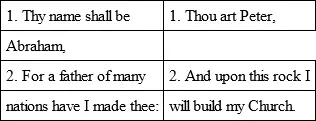Thomas Allies - St. Peter, His Name and His Office, as Set Forth in Holy Scripture
Здесь есть возможность читать онлайн «Thomas Allies - St. Peter, His Name and His Office, as Set Forth in Holy Scripture» — ознакомительный отрывок электронной книги совершенно бесплатно, а после прочтения отрывка купить полную версию. В некоторых случаях можно слушать аудио, скачать через торрент в формате fb2 и присутствует краткое содержание. Жанр: foreign_antique, foreign_prose, на английском языке. Описание произведения, (предисловие) а так же отзывы посетителей доступны на портале библиотеки ЛибКат.
- Название:St. Peter, His Name and His Office, as Set Forth in Holy Scripture
- Автор:
- Жанр:
- Год:неизвестен
- ISBN:нет данных
- Рейтинг книги:3 / 5. Голосов: 1
-
Избранное:Добавить в избранное
- Отзывы:
-
Ваша оценка:
- 60
- 1
- 2
- 3
- 4
- 5
St. Peter, His Name and His Office, as Set Forth in Holy Scripture: краткое содержание, описание и аннотация
Предлагаем к чтению аннотацию, описание, краткое содержание или предисловие (зависит от того, что написал сам автор книги «St. Peter, His Name and His Office, as Set Forth in Holy Scripture»). Если вы не нашли необходимую информацию о книге — напишите в комментариях, мы постараемся отыскать её.
St. Peter, His Name and His Office, as Set Forth in Holy Scripture — читать онлайн ознакомительный отрывок
Ниже представлен текст книги, разбитый по страницам. Система сохранения места последней прочитанной страницы, позволяет с удобством читать онлайн бесплатно книгу «St. Peter, His Name and His Office, as Set Forth in Holy Scripture», без необходимости каждый раз заново искать на чём Вы остановились. Поставьте закладку, и сможете в любой момент перейти на страницу, на которой закончили чтение.
Интервал:
Закладка:
Nay, we may put in parallel columns the two promises, thus —

And just as in the former, the second clause contains the reason of the first, so in the latter likewise the two clauses cohere, as the name and its explanation. Again, the dignity of the one is expressed as that of the Father; of the other as that of the Rock. Further, those alone can share the blessing of Abraham, who are born of his spirit: and those alone the stability divinely granted to Peter, who refuse by any violence, or at any cost, to be separated from him.
But Abraham was thus raised to be the friend of God, associated in the divine Fathership, and made the teacher of posterity; and therefore, as being such, God would show him His counsels, that through him they might descend to his children. "And the Lord said, Can I hide from Abraham what I am about to do? for I know that he will command his children and his household after him to keep the way of the Lord." In a precisely similar way, when God would call the Gentiles to the light of the Gospel, He shewed it by a special revelation to Peter alone: "There came upon him an ecstasy of mind; and he saw the heaven opened; and this was done thrice." And the reason of so preferring Peter was God's decree, that through him all other Christians, even the Apostles themselves, might be informed, and convinced. "You know that in former days God made choice among us that by my mouth the Gentiles should hear the word of the Gospel and believe." "And thou, when thou art converted, confirm thy brethren." 56 56 Gen. xviii. 17; Acts x. 10; xv. 7; Luke xxii. 32.
Finally, as God pronounces Abraham blest, so Christ pronounces Peter; and as He made Abraham the source and fountain-head of blessing and strength to all others, so no less did Christ make Peter. Of the first we read, "I will bless thee, and will make thy name great, and thou shalt be a blessing;" of the second, "Blessed art thou, Simon Bar Jonah; – and upon this rock I will build My Church."
In one word, the parallel is as follows between Abraham and Peter. Both receive a remarkable call, and follow it; both are promised and receive a new, and that a prophetical name; of both signal instances of faith and love are required; both furnish these, and therefore do not lose the increase of their reward; to Abraham his prophetical name is explained, and to Peter likewise; Abraham understands his destination to be the Father of all nations, and Peter that he is made the Rock of the universal Church; Abraham is called blest, and so Peter; to Abraham it is revealed that no one, save from him, and through him, shall share the heavenly blessing; to Peter that all, from him, and through him, shall gain strength and stability; it is only through Abraham that his posterity can promise itself victory over the enemy, and only through being built on Peter, the Rock, that the Church will triumph over the gates of hell; in fine, if Abraham, as the teacher of the faithful, is instructed in the divine counsels with singular care, not less is shown to Peter, whom Christ has made the doctor and teacher of all believers.
The gifts thus bestowed on Abraham and Peter are peculiar , for they are read of no one else in the Holy Scriptures; they are not only gifts , but a reward for singular merit; and in their own nature they cannot be general . As by them Abraham is put into a relation of Fathership , so that all the faithful become his children, so Peter being called and made the Rock and Foundation of the Church, all its members have a dependence on him.
And if these gifts are peculiar , no less do they convey a singular dignity and pre-eminence . For it follows that, as S. Paul says, 57 57 Gal. iii. 7.
that all the faithful are children of Abraham, being heirs not of his flesh, but of his spirit and faith; so no one is, or can be, a part of the Church's building, who rests not on Peter as the foundation. For the same God who said to Abraham, "Thy name shall no longer be called Abram, but Abraham shall be thy name," said also to Simon, "Thou shalt not be called Simon, but Cephas;" the same God who said to the former, "In thee shall all families of the earth be blessed," said to the latter, "Upon this Rock I will build my Church."
What is the source of this pre-eminence in both? To both the same objection may be made, and for both the same defence.
How should blessing and adoption be propagated from Abraham, as a sort of head, into the whole body of the faithful? Because Abraham is considered as joined with that mighty Seed his offspring, whence in chief and primarily the salvation of all depends; because Abraham is made by participation partner of that dignity which naturally and substantially belongs to the Seed that was to spring from him. God Himself has told us this, and His Apostle S. Paul explained it. For as we read that it was said to Abraham, "In thee shall all nations of the earth be blessed," so God Himself has told us that in thee, by thee , means in, by thy seed . Hence S. Paul: 58 58 Gal. iii. 16.
"To Abraham were the promises made, and to his seed. He saith not, seeds, as of many, but as of one, and to thy seed, which is Christ." So that the divine words, "In thee shall all nations of the earth be blessed," give this meaning: "As thou shalt give flesh to my only begotten Son whom I cherish in my bosom, whence He shall be called at once 'the Son of God and the Son of Abraham,' 59 59 Matt. i. 1.
so He makes thee a partner of His dignity and excellence, whence, if not the source and origin, yet thou shalt be a broad stream of blessing to be poured out on all nations."
Now just in the same manner is Peter the Rock of the Church, and the cause next to Christ of that firmness with which the Church shall remain impregnable to the end. For therefore is he the Rock and Foundation of the Church, because he has been called into a sort of unity with Him of whom it is said, "Behold I lay in Sion a chief corner stone, elect, precious, and he that believeth on it shall not be ashamed: " and in whom, as Paul explains, "the whole building fitly framed together increaseth unto a holy temple in the Lord." 60 60 Is. xxviii. 16; Eph. ii. 21.
Therefore is he the Church's Rock, because as he, by his own confession, declared the Godhead of the Foundation in chief, "Thou art the Christ, the Son of the living God," so from Him, who is the chief and substantial Foundation, he received the gift of being made partner in one and the same property: "And I too say unto thee, that thou art Peter, and upon this rock I will build my Church;" one with Me by communication of My office and charge, My dignity and excellency. Hence the stability of Peter is that of Christ, as the splendour of the ray is that of the sun; Peter's dignity that of Christ, as the river's abundance is the abundance of the fountain. Those who diminish Peter's dignity may well be charged with violating the majesty of Christ; those who are hostile to Peter, and divorced from him, stand in the like opposition to Christ.
Now this parallel is an answer 61 61 Passaglia, p. 58.
to those who object to Peter's supereminence as the Foundation, that this dignity is entirely divine, surpassing by an almost infinite degree the capacity of man. For is not that a divine dignity which consists in the paternity of all the faithful? Is not that prerogative beyond man's capacity by which one becomes the author of a blessing diffused through all nations? Yet no one denies that such a dignity and such a prerogative were granted to Abraham. In divine endowments, therefore, their full and natural possession must be carefully distinguished from their limited and analogous participation . The one, as inherent, cannot fall to the creature's lot; the other, as transferable, may be granted as God pleases. For what further removed from man than the Godhead? Yet it is written, "I have said, ye are Gods." 62 62 Ps. lxxxii. 6, with John x. 34.
Интервал:
Закладка:
Похожие книги на «St. Peter, His Name and His Office, as Set Forth in Holy Scripture»
Представляем Вашему вниманию похожие книги на «St. Peter, His Name and His Office, as Set Forth in Holy Scripture» списком для выбора. Мы отобрали схожую по названию и смыслу литературу в надежде предоставить читателям больше вариантов отыскать новые, интересные, ещё непрочитанные произведения.
Обсуждение, отзывы о книге «St. Peter, His Name and His Office, as Set Forth in Holy Scripture» и просто собственные мнения читателей. Оставьте ваши комментарии, напишите, что Вы думаете о произведении, его смысле или главных героях. Укажите что конкретно понравилось, а что нет, и почему Вы так считаете.












